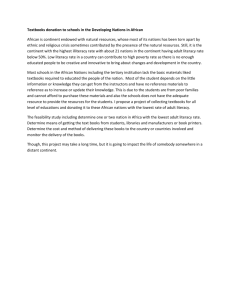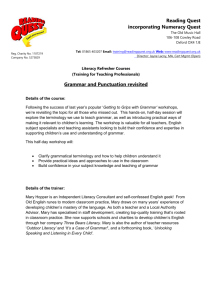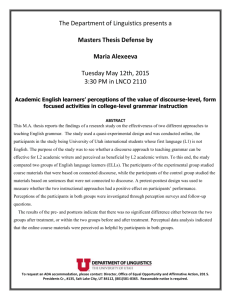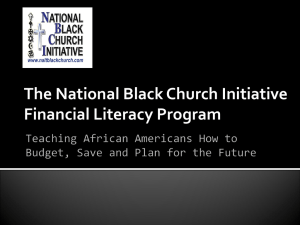2-page proposal file
advertisement
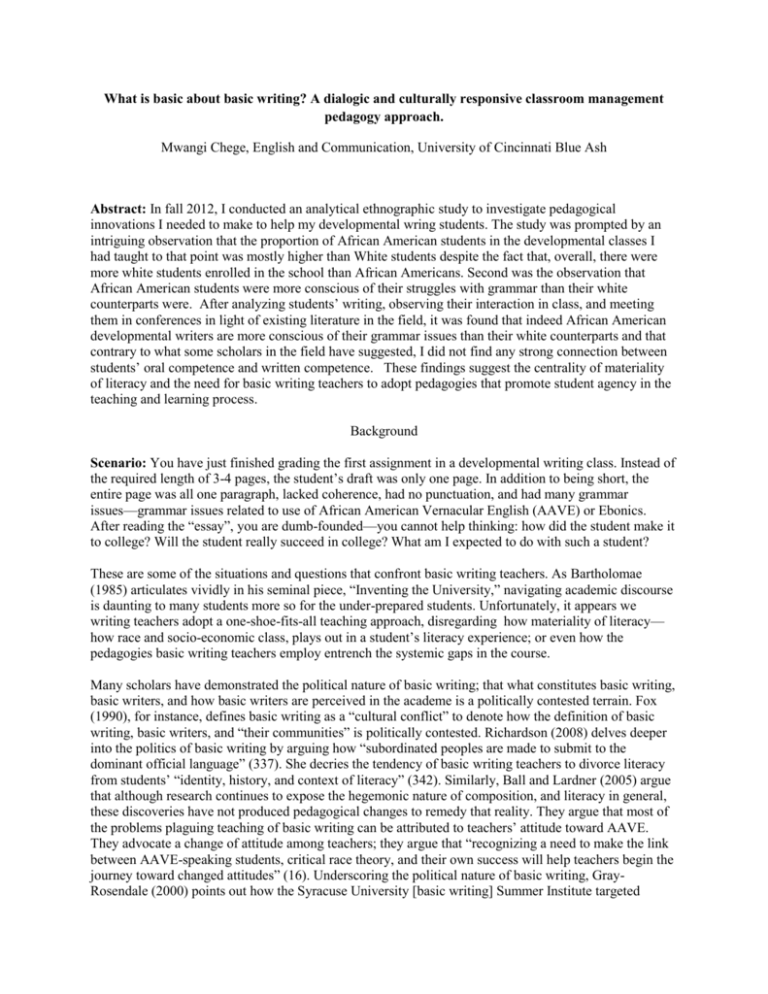
What is basic about basic writing? A dialogic and culturally responsive classroom management pedagogy approach. Mwangi Chege, English and Communication, University of Cincinnati Blue Ash Abstract: In fall 2012, I conducted an analytical ethnographic study to investigate pedagogical innovations I needed to make to help my developmental wring students. The study was prompted by an intriguing observation that the proportion of African American students in the developmental classes I had taught to that point was mostly higher than White students despite the fact that, overall, there were more white students enrolled in the school than African Americans. Second was the observation that African American students were more conscious of their struggles with grammar than their white counterparts were. After analyzing students’ writing, observing their interaction in class, and meeting them in conferences in light of existing literature in the field, it was found that indeed African American developmental writers are more conscious of their grammar issues than their white counterparts and that contrary to what some scholars in the field have suggested, I did not find any strong connection between students’ oral competence and written competence. These findings suggest the centrality of materiality of literacy and the need for basic writing teachers to adopt pedagogies that promote student agency in the teaching and learning process. Background Scenario: You have just finished grading the first assignment in a developmental writing class. Instead of the required length of 3-4 pages, the student’s draft was only one page. In addition to being short, the entire page was all one paragraph, lacked coherence, had no punctuation, and had many grammar issues—grammar issues related to use of African American Vernacular English (AAVE) or Ebonics. After reading the “essay”, you are dumb-founded—you cannot help thinking: how did the student make it to college? Will the student really succeed in college? What am I expected to do with such a student? These are some of the situations and questions that confront basic writing teachers. As Bartholomae (1985) articulates vividly in his seminal piece, “Inventing the University,” navigating academic discourse is daunting to many students more so for the under-prepared students. Unfortunately, it appears we writing teachers adopt a one-shoe-fits-all teaching approach, disregarding how materiality of literacy— how race and socio-economic class, plays out in a student’s literacy experience; or even how the pedagogies basic writing teachers employ entrench the systemic gaps in the course. Many scholars have demonstrated the political nature of basic writing; that what constitutes basic writing, basic writers, and how basic writers are perceived in the academe is a politically contested terrain. Fox (1990), for instance, defines basic writing as a “cultural conflict” to denote how the definition of basic writing, basic writers, and “their communities” is politically contested. Richardson (2008) delves deeper into the politics of basic writing by arguing how “subordinated peoples are made to submit to the dominant official language” (337). She decries the tendency of basic writing teachers to divorce literacy from students’ “identity, history, and context of literacy” (342). Similarly, Ball and Lardner (2005) argue that although research continues to expose the hegemonic nature of composition, and literacy in general, these discoveries have not produced pedagogical changes to remedy that reality. They argue that most of the problems plaguing teaching of basic writing can be attributed to teachers’ attitude toward AAVE. They advocate a change of attitude among teachers; they argue that “recognizing a need to make the link between AAVE-speaking students, critical race theory, and their own success will help teachers begin the journey toward changed attitudes” (16). Underscoring the political nature of basic writing, GrayRosendale (2000) points out how the Syracuse University [basic writing] Summer Institute targeted minority students. Many other scholars and commentators have pointed out the correlation between socioeconomic status and educational success; that economic success is now a major determinant of education success than even race—although there is an undeniable correlation between race and socio-economic mobility (Reardon and Biscoff, 2011). Exposing the materiality of basic writing is crucial to understanding how the academe reproduces the socio-economic structures in a society; but, as a practitioner, it warrants to mesh theory with praxis to produce innovative pedagogies for working with basic writing students. With regard to praxis, Gray-Rosendale (2000) argues that research on basic writing has for a long time focused on the wrong question—on “Who is a Basic Writer” as opposed to “What can and Basic Writers do” (3). By focusing on the latter, she found out that her students (mostly minorities), who were struggling with written discourse “had a great oral, rhetorical dexterity” (3). This allowed her to design ways to help students “bring these skills into their written work” (5). Richardson (2008) makes a similar observation, citing research in which raters of the National Assessment Education Progress (NAEP) essays “highly evaluated Black students’ writing as powerful and fluent when it evinced higher use of Black discourse style” (338). The two authors’ observations seem to give credence to The National Council of Teachers of English (NCTE) and the Conference on College Composition and Communication Students (CCCC) unequivocal endorsement of students’ Right to Their Own Language (STROL) (Perrman-Clark, 2013). Methods and results Having taught developmental writing at University of Cincinnati Blue Ash, a two-year open-enrollment college, for several years, I have been intrigued by two observations. First, is the higher proportion of African Americans in developmental classes I have taught, and, second, many of these students identify grammar as the main area they struggle with in writing. These two factors led me to design an analytic autoethnographic study, research in which the researcher is: “(1) a full member in the research group or setting, (2) visible as such a member in published texts, and (3) committed to developing theoretical understandings of broader social phenomena” (Anderson, 2006, p. 373). Using one of the developmental classes I was teaching in fall 2012, the study investigated how, in light of Gray-Rosendale and Richardson’s proposition, I could use my students’ strong oral competence to develop their writing skills. By analyzing the students’ writing, observing students’ interaction in class, and meeting with students in one-on-one conferences, I sought answers to the following questions: What are the students’ literacy backgrounds? What are the students’ perceptions of academic writing? What do the students’ think about how writing has been taught to them? Using a dialectic approach to triangulate the data that I collected with research in the field of Composition, and basic writing in particular, my preliminary findings are: (1) African American students are more conscious of their grammar issues than their white counterparts, and, (2) I did not see a correlation between students’ oral/verbal skills and their writing. In light of these findings, I formulated the following pedagogical recommendations: (i). Know and humanize students: That a dialogic and culturally responsive classroom management approach provides both a theoretical framework and praxis requisite for minimizing resistance and tension between teachers and students that often characterize many basic writing classes (Milner and Tenore), (ii) Re-think course design: That basic writers are not necessarily basic intellectually and, therefore, the need for teachers to develop challenging curriculums and assignments to students, (iii) Re-examine assessment rationale and practice: the need for teachers to demystify grammar by adopting holistic assessment matrices. Discussion and Conclusion There is no silver bullet on how to address the myriad challenges teachers of basic writing are confronted with. What complicates the field even more is the dearth of scholarship in the field that addresses pedagogical innovation. Most times, basic writing teachers are left to fend for themselves. The main objective of this presentation is to challenge teachers, especially teachers of basic writing and those who teach other preparatory or remedial courses, to re-think our attitudes towards our students and how those attitudes inform the pedagogies we adopt, the curriculums we design, and our interaction with students. The preliminary take-a way from this study is that it is important for teachers to adopt pedagogies that foreground students’ agency. This would entail developing intellectually stimulating curriculums and a culturally responsive teacher-student interaction. References Anderson, L. (2006). Analytical Autoethnography. Journal of Contemporary Ethnography, 35(4), 373-395. Ball, A. & Lardner, T. (2005). African American Literacies Unleashed: Vernacular English and the Composition Classroom. Carbondale: Southern Illinois University Press. Bartholomae, D. (1985). Inventing the University. In M. Rose (Ed.), When a Writer Can’t Write. Studies in Writer’s Block and Other Composing-Process Problems (273-285). New York: Guilford. Fox, T. (1990). Basic Writing as Cultural Conflict. Journal of Education, 172(1), 65-83. Gray-Rosendale, L. (2000). Re-thinking Basic Writing: Exploring Identity, Politics, and Community in Interaction. Mahwah: Lawrence Erlbaum. Milner, R &Tenore, B. (2010). Classroom Management in Diverse Classrooms. Urban Education, 45(5), 560-603. Perrman-Clark, S. (2013). African American Language, Rhetoric, and Students’ Writing: New Directions for STROL. College Composition and Communication, 64(3), 469-495. Reardon, S. & Bischoff, K. (2011). Income Inequality and Income Segregation. The American Journal of Sociology, 116(4), 1092-1153. Richardson, E. (2008). African American Literacies. In B. Street & N.H. Hornbereger (Eds.), nd Encyclopedia of Language and Education (2 ed. Vol. 2), 335-346.
